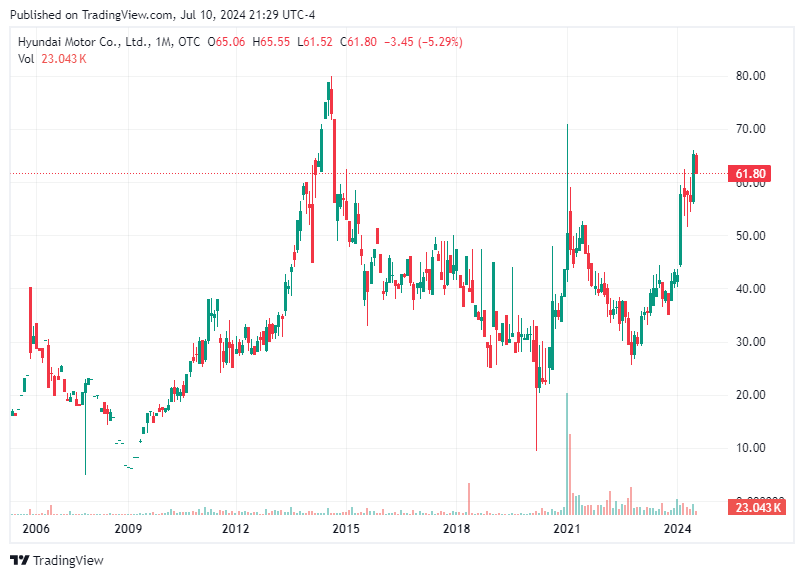Hyundai Dealers Accused of Allegedly Reporting Fake EV Sales
Hyundai Dealers Accused of Pushing Fake EV Sales in New Lawsuit.

Disclaimer: The following article is a detailed examination of recent allegations against Hyundai dealers and does not constitute legal advice or an endorsement of any claims. All information presented is based on current reports and should be interpreted with caution.
Real-time information is available daily at https://stockregion.net
A new lawsuit has emerged implicating Hyundai dealers in allegedly reporting fake electric vehicle (EV) sales to meet specific targets and quotas. This development raises questions about the authenticity of Hyundai’s reported EV sales and paints a complex picture of the automaker's internal operations. A group of Hyundai dealers, led by Napleton Aurora Imports in Illinois and affiliated franchises, brought forth these allegations in Chicago federal court, asserting that Hyundai Motor America Corp (HMA) pressured dealers into misusing inventory codes designed for “loaner” vehicles to inflate sales figures.
According to the lawsuit, Hyundai dealers who complied with these alleged practices were rewarded with wholesale and retail price discounts and other incentives. Conversely, dealers who refused to participate faced punitive measures from Hyundai. The lawsuit, filed on a recent Friday, claims that this pressure to misrepresent sales data was an orchestrated effort by HMA. Hyundai responded to these allegations with a statement on Monday, asserting that it does not condone falsifying sales data and has since initiated an investigation upon being alerted to these claims. Hyundai revealed ongoing litigation in South Florida aimed at terminating two Napleton-affiliated franchises related to a criminal sexual battery allegation.
The complaint further accused Hyundai of fraud and violating the Robinson-Patman Act—a federal antitrust law that prohibits price discrimination. Primarily, dealers who acquiesced to the alleged improper coding of vehicles were reportedly granted access to additional inventory of faster-selling Hyundai models. This selective allocation of inventory is said to have deprived customers of choice while enabling Hyundai to present a more favorable image of its sales performance to the public and investors.
The lawsuit elaborates on the repercussions of this alleged scheme, highlighting that it generated a misleading portrayal of organic sales growth driven by consumer demand. Instead of genuine market-driven demand, the lawsuit claims HMA created a multilayered strategy to pressure its dealers into reporting false sales. An instance cited in the lawsuit includes statements from a Hyundai district sales manager who reportedly said, “we gotta hit a number for the press and for the Koreans.” This statement presents the alleged internal pressure to fabricate sales data to meet external expectations. If these allegations hold true, they could impact not only Hyundai's reputation but also the broader automotive industry.
Hyundai's EV Market Performance
To understand the broader context surrounding these allegations, it is essential to examine Hyundai's performance in the electric vehicle market. Despite the lawsuit, Hyundai's U.S. CEO Randy Parker has expressed optimism about the company's EV market prospects. In an interview with Automotive News, Parker mentioned that the EV market is expected to become even more competitive in the latter half of the year. Hyundai reported U.S. sales results on July 2, revealing a 1.2 percent increase compared to the previous year, with a total of 399,523 vehicles sold in the first half of the year. Notably, electric vehicles accounted for 7.3 percent of Hyundai’s total sales during this period. Hyundai's share of EV sales within the industry also grew from 3.4 percent in January to 5.4 percent in the first half of the year.
Parker emphasized that despite narratives suggesting consumer disinterest in EVs, Hyundai's sales performance speaks to a different reality. "The proof is always in the performance, and we perform quite well," Parker stated. This assertion highlights Hyundai’s commitment to maintaining its momentum in the EV market, irrespective of the ongoing legal challenges. The lawsuit against Hyundai raises crucial legal and ethical considerations about corporate transparency and integrity. The allegations of falsifying sales data not only undermine trust in Hyundai’s reported figures but also pose legal risks. If proven true, these practices could lead to severe consequences, including financial penalties, loss of consumer trust, and potential regulatory scrutiny.
Moreover, the case touches upon the broader issue of corporate governance and the ethical responsibilities of multinational corporations. Companies are expected to maintain high standards of honesty and accuracy in their business practices. Any deviation from these principles can erode stakeholder confidence and damage the brand’s reputation.
Potential Impact on the Automotive Industry
The implications of this lawsuit extend beyond Hyundai, potentially affecting the entire automotive industry. If similar practices are discovered within other companies, it could trigger a wave of investigations and reforms aimed at ensuring compliance with ethical standards. Additionally, the case may prompt regulatory bodies to tighten oversight and enforcement of sales reporting practices within the industry. Such developments could lead to more stringent regulations governing how automakers report their sales figures. Increased transparency and accountability would benefit consumers, investors, and the market as a whole by providing a clearer picture of actual demand and performance.
Looking ahead, the outcome of this lawsuit will likely influence Hyundai’s direction and its position in the EV market. The company’s response to these allegations and its ability to address the underlying issues will be critical in shaping its future trajectory. Transparent communication and corrective measures will be essential in rebuilding trust with consumers and stakeholders. The broader EV market continues to evolve rapidly, driven by technological advancements, regulatory changes, and shifting consumer preferences. Hyundai’s commitment to expanding its EV offerings and maintaining competitive pricing will play a vital role in its ability to navigate this dynamic landscape. As competition intensifies, automakers must prioritize innovation, quality, and customer satisfaction to succeed in the long term.
The lawsuit against Hyundai alleging the falsification of EV sales data presents challenges and highlights the importance of corporate integrity. While the allegations are serious, they also offer an opportunity for Hyundai to demonstrate its commitment to transparency and ethical conduct. As the legal proceedings unfold, the automotive industry will closely monitor the case’s developments and their potential impact on sales reporting practices.
In light of this, it is crucial for consumers, investors, and regulators to remain vigilant and advocate for higher standards of corporate governance. The future success of the EV market depends on the credibility and trustworthiness of the companies driving innovation and sustainability in the automotive sector.
Disclaimer: This article is for informational purposes only and does not constitute legal advice. The views expressed herein are based on current reports and allegations, which may evolve as new information becomes available. Readers are encouraged to seek professional guidance regarding any legal matters.
Real-time information is available daily at https://stockregion.net


